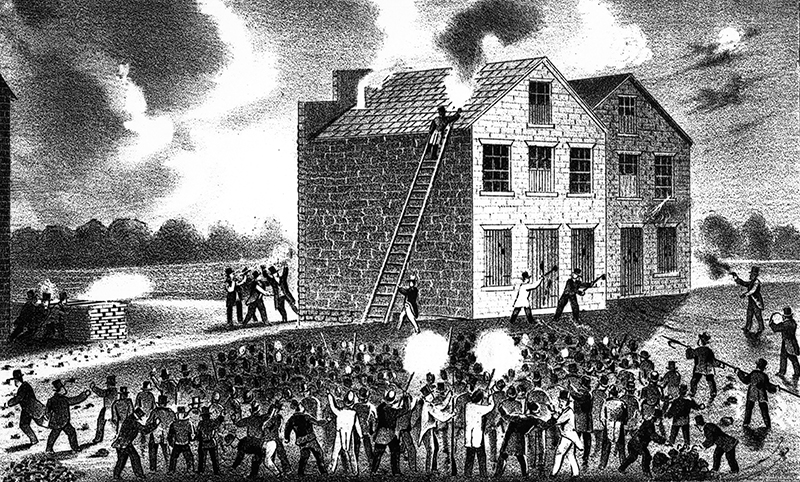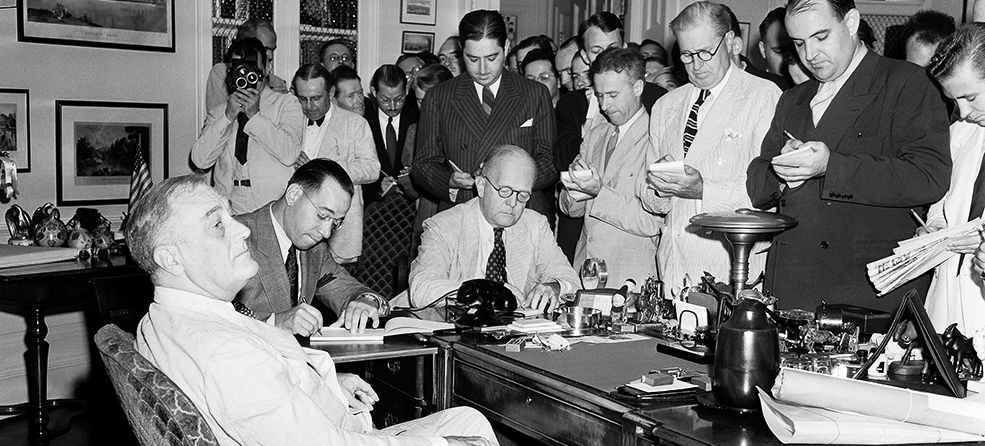We asked ten historians in this issue to give us their assessments of Donald Trump's accomplishments, both good and bad.
-
February/March 2021
Volume66Issue2

It is often said that journalism is “the first rough draft of history,” and in recent years we've certainly had an abundance of drafts written about Donald Trump.
But we wondered what actual historians would say about events since the last election, so we sent out some inquiries. The response was overwhelming.
So we've included in this issue eleven of the best essays we received written by historians reflecting on the Trump presidency, in addition to the previous essays on historic administrations by James Banner and his colleagues.
Normally, American Heritage shies away from publishing opinions, but these historians were passionate about recent events so we've let them speak their minds.
Both David Reynolds and Bruce Watson reacted to the Capitol attack by pointing to Abraham Lincoln’s warnings about the “mobocratic spirit” and the danger when citizens operate outside the rule of law. In a democracy, Lincoln feared, autocratic politicians will inevitably surface, “and when such a one does, it will require the people to be united with each other, attached to the government and laws, and generally intelligent, to successfully frustrate his design.”
Watson writes about the famous Lyceum Speech, which Lincoln delivered in 1838 after an angry mob killed an abolitionist editor and threw his printing press into the Mississippi River. The young lawyer warned that, “Whenever the vicious portion of population shall be permitted to gather in bands of hundreds and thousands, and burn churches, ravage and rob provision-stores, throw printing presses into rivers, shoot editors, and hang and burn obnoxious persons at pleasure, and with impunity, depend on it – this government cannot last.”
Reynolds notes in his essay here that Lincoln also worried about another potential danger: the ascension to the presidency of a demagogue who was interested more in his own power than the sanctity of the Constitution. “Lincoln was a firm believer in the strength of the American Constitution, which he called the last, best hope of earth,” notes Reynolds.
Looking for a balanced assessment of Trump's presidency, I reached out to David Shribman, a Pulitzer Prize-winning journalist who recently retired as executive editor of the conservative-leaning Pittsburgh Post-Gazette. Shribman has written a number of even-handed essays about how transformative a president Donald Trump was.
“But I wouldn't write the same thing now,” Shribman told me. “The events of January 6 have changed everything.” In a thoughtful and wide-ranging essay in this issue, he looks at the positive and negative accomplishments of Donald Trump.
“We can be sure that fair-minded historians of the future will recognize, perhaps grudgingly, that Mr. Trump was, if nothing else, truly consequential,” writes Shribman. In fact, he believes that Trump is ”perhaps the most consequential one-term president in nearly 175 years,” even if he was “a fierce tornado run amuck.”

And we were delighted to hear from Bernard Weisberger, the “dean of American Heritage historians,” who wrote the first of his 45 articles for the magazine in 1955. The events of January 6 at the Capitol so moved Prof. Weisberger that he wrote a passionate essay reminding us that “eternal vigilance will always be the price of freedom.”
Weisberger compares Teddy Roosevelt's use of “the bully pulpit" and Franklin Roosevelt's twice-weekly conferences with journalists to President Trump’s “savage tweets and screams about the injuries he was enduring at the hands of the 'fake news.'”
Edwin Yoder, who won a Pulitzer Prize for editorial writing, believes that “character is destiny.” He criticizes President Trump for tearing down the CIA and FBI, canceling valuable treaty commitments, and attacking Obama’s health care legislation. Trump seems to “delight in confounding every expectation of regularity in government for the mere hell of it,” he writes.
What's the cause of Trump's behavior? Yoder believes that he has “a severe case of bad manners,” writing that he was reminded of Edmund Burke, an English philosopher who greatly influenced the Founding Fathers. “Manners are of more importance than laws,” observed Burke. “Upon them, in a great measure, the laws depend.”
Curtis Wilkie, who was the longtime southern bureau chief of the Boston Globe before turning to writing five books of history, compared the Capitol attack to the riot he saw when he was a student at Ole Miss. In that “other ugly insurrection,” which left two dead and hundreds injured, demagogues incited a crowd that was “a devil’s brew of Ku Klux Klansmen, political extremists and 'good ole boys'” to prevent James Meredith from integrating the university. Wilkie saw eerie similarities in the crowd that attacked the Capitol.
David Stewart, a lawyer turned historian who has written ten well-regarded books, including a definitive work on the impeachment of Andrew Johnson, worries that we have not yet reached a turning point in dealing with the forces unleashed by Trump's constant agitation. “Even after the violence at the Capitol, more than 100 Republican Congressional representatives voted to 'investigate' the integrity of the 2020 presidential election in several states, something they have no power to do," he notes in this issue. “That appalling fact suggests the attack on the Capitol was not a turning point for one-fourth of the members of the House of Representatives.”
Historian Lucian K. Truscott IV deplores the Republican amnesia and says the evidence is damning that this was an attempted coup. “The simple facts ought to be enough: Trump whipped up a mob of his followers and sent them down Pennsylvania Avenue to the Capitol to stop what was taking place,” he notes. One rioter shouted into a bullhorn, “Pence should be put under the gallows... I hope he’s put under the firing squad and found guilty of treason.”
Although most historians believe that Trump's incitement of the attack on the Capitol was “a pathetic low,” as Alex Kershaw says in this issue, others come to his defense.
Victor Davis Hanson writes that the latest impeachment gambit was really just “meant to discredit President Trump’s supporters and perhaps stop him from running for president again.” From now on, he worries, “House impeachment will be used by the out-party as a periodic club to wound a first-term president. President-elect Biden should beware.”
Amy Denton of Lone Star College points out that, “Many Americans believe they have been lied to by the media, and that the good things Donald Trump accomplished have been ignored.”
But everyone can agree that it's time to show more restraint. And honor the traditions that bind our nation together, not tear them apart.
“Lincoln saved America by always putting the nation above himself," observes David Reynolds in this issue. “While in office, he did not inflame passions by playing to a political base. Steadily, surely, humbly, he pushed the nation toward human justice.”

